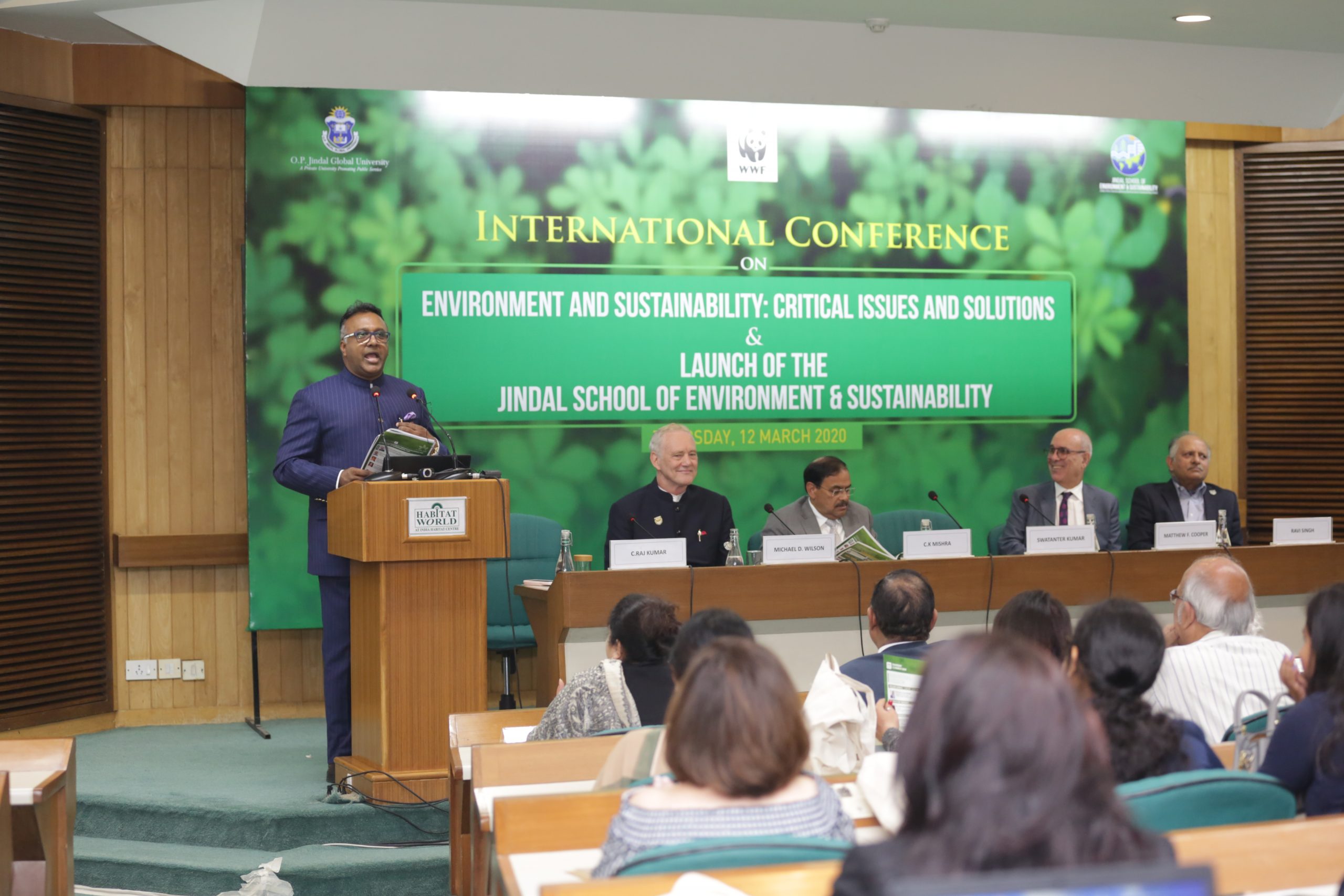Hawaii, with its glistening beaches, tropical sunny skies, breath-taking valleys and endless coconut trees is the very epitome of paradise on Earth. Hawaii is a happy place. An ‘ideal environment’ as Hon’ble Justice Michael D. Wilson, Judge, Supreme Court of Hawaii, USA called it, during his special address at the International Conference on ‘Environment & Sustainability: Critical Issues and Solutions’ held at India Habitat Centre in New Delhi on Thursday, 12th March, 2020. By the end of the century, or perhaps even by 2060, when sea levels rise by up to 3.2 feet as predicted, and the Waikiki beach area among others drowns, the economic loss in the tiny ocean state could be a whopping $15 billion or more. The exact number may be fuzzy, but even in the ballpark, it is shocking.
This pinnacle of beauty, this perfect place on Earth, is on a seemingly unstoppable trajectory towards disaster. The world is subject to devastating blows of hurricanes, cyclones, tsunamis and floods, no longer so far or few between. Droughts are becoming longer and freak rainfall is growing common. Natural disasters stemming from man-made circumstances are taking lives and livelihoods. By 2050, our neighbour Bangladesh could be in the midst of a major humanitarian crisis, as significant areas of the country may be underwater. Millions of people will need to be evacuated, find new homes, new lives. They are not alone. According to the UN, there could be anywhere between 25 million and 1 billion ‘environmental or climate migrants’ across the globe by 2050. Temperatures are rising, breaking new records year after year—six of the hottest years on Earth have been the last six from 2014-2019.
From melting poles to sinking coastlines, stormy inlands to scorching skies, the whole world is facing the brunt of climate change effects. India, too, is on the frontline. “No sooner do we finish with one challenge that we’re faced with another,” says C.K. Mishra, IAS, Secretary, Ministry of Environment, Forest and Climate Change, Government of India, in his inaugural address at the conference, which was organised by O.P. Jindal Global University (JGU) and World Wide Fund for Nature (WWF).
The day-long conference built up to the announcement of a new school at JGU—the Jindal School of Environment & Sustainability. JSES has been established in response to the growing interest to study issues relating to the environment. The school—headed by Dean, Prof. (Dr.) Armin Rosencranz, who is a lawyer and political scientist and widely-acclaimed environmental law expert—is set to offer its first programme, B.A. (Hons.) Environmental and Sustainability Studies in the academic year starting 2020. JSES hopes to use the momentum of the conference to engage in efforts to identify solutions surrounding the environment.
Here’s a look at some of the key takeaways from the event.
- Reinventing the approach to environmental sustainability
The recent COVID-19 outbreak has truly shaken the world. In many ways, it is not unlike a climate catastrophe that could befall us in the future. “The challenge the world is facing today should be a wake-up call for potential disasters in the times to come. Future environmental disasters—the future of the planet based on climate change—won’t give us time to plan. It’s important to recognise challenges and develop nuanced, empirical understanding of how to act,” says Prof. (Dr.) C. Raj Kumar, Founding Vice Chancellor, JGU, in his welcome address at the conference. “Universities have a responsibility to engage in this conversation. The nature of problems today requires collective imagination,” he adds, drawing focus to the importance of education in creating a sustainable future. JGU’s schools, particularly Jindal School of Government and Policy, Jindal Global Law School and the newly launched JSES offer dynamic, contemporary, and multidisciplinary curriculum that prepares young people with the competencies to act for the environment.
‘Environmental sustainability’ is a concept we are all familiar with. Yet how many of us even adhere to the 3 simple R’s—Reduce, Reuse, Recycle? The Paris Agreement of 2015 was one of the fast approved agreements, signed by 196 nations. But how many nations are actively committed to reducing their carbon emissions? How prepared are countries to deal with the effects of climate change? The answers are not reassuring.
The United Nations’ Sustainable Development Goals (SDGs) are a list of 17 global goals for sustainability aimed to be achieved by 2030. There are 169 ‘targets’ and 232 ‘indicators’. “We’re getting lost in semantics. We need to pick up action points and projects where you can contribute,” says Secretary Mishra. We need to break global barriers to transfer knowledge and technologies. Governments alone cannot drive environmental reform. Instead ‘it has to be a collective effort to work together’. Only then can we look forward to brighter futures.
“The issues that confront us are all known to us. Yet there’s a rapidly growing complexity and uncertainty of how to manage a world that’s getting out of control. We have no way of dealing with the unexpected. We have to move beyond silos and systems of governments. We need skills, education systems to deal with that. We need skilled professionals who’re flexible and can deal with constructs that can make a difference,” says Ashok Khosla, environmentalist, Founder & Chairperson, Development Alternatives, during a panel discussion on ‘Understanding Sustainability Policy: Governance, Knowledge and the Search for Integration’. The time has come to look at environmental sustainability with a new lens. The fate of all nations is deeply entwined today, especially in the context of climate change. Acting together, as one, is the way forward. JSES recognises the need for collaboration among industry, government, academics and communities. The school looks forward to developing a strategic plan that builds a sustainable future in this extraordinary time.
2. Development and enforcement of environmental laws & policies
A recurring theme at the conference was the question—are environmental laws built for effective implementation? There is a lot of research and talk on what the challenges are and what needs to be done. From the UN’s SDGs and international policies to national laws to protect and preserve the environment and grow sustainably, there has been a boon in setting up frameworks. But it takes two to tango. “Science and law are out of step,” exclaims Dr. Archana Negi, Associate Professor, School of International Studies, Jawaharlal Nehru University. There are gaps in implementation. It seems there is a disconnect between environmental laws and their ability to change or influence behaviour.
So what needs to change? Perhaps most importantly, there is a need to simplify environmental regulation so that even the lay person can understand it and adhere to it. “We make environmental jurisprudence sound too complicated. It’s not a subject for the highest order of society,” says Justice Swatanter Kumar who is a former Judge of the Supreme Court of India, and former Chairperson, National Green Tribunal. He urges that all prevention, control and regulation of environmental issues should be part of basic academic coursework at the school level—so that every little child knows how to protect the environment. At the end of the day, for governance and justice to be effective—there need to be ‘less laws, greater implementation and greater understanding’.
3. Building green—it’s time to move beyond economy vs. ecology
If the entire Indian population moves to air conditioning in the next 20 years, it means all global standards of environmental sustainability will go out the window, if nothing is done to balance it, believes Mr. Tapas Paul, who is a Lead Environmental Specialist at the Work Bank. “Energy efficiency doesn’t cost more,” added Mr. Paul. It just needs to be approached smartly.
So the very idea of ‘green or energy efficient’ infrastructure needs to be synonymous with ‘good’ infrastructure. Developmental demands will only increase in the future. Strategies have to be developed that integrate economy and ecology. At the end of the day, sustainable development should not be considered as an alternative practice, but the only way forward.
These are the challenges that JSES aspires to address—the environmental needs of the 21st century. The new school appeals to ecologically conscious youth to make the most of a transdisciplinary approach to learning so they can contribute to global and local environment and sustainability challenges of the future.



